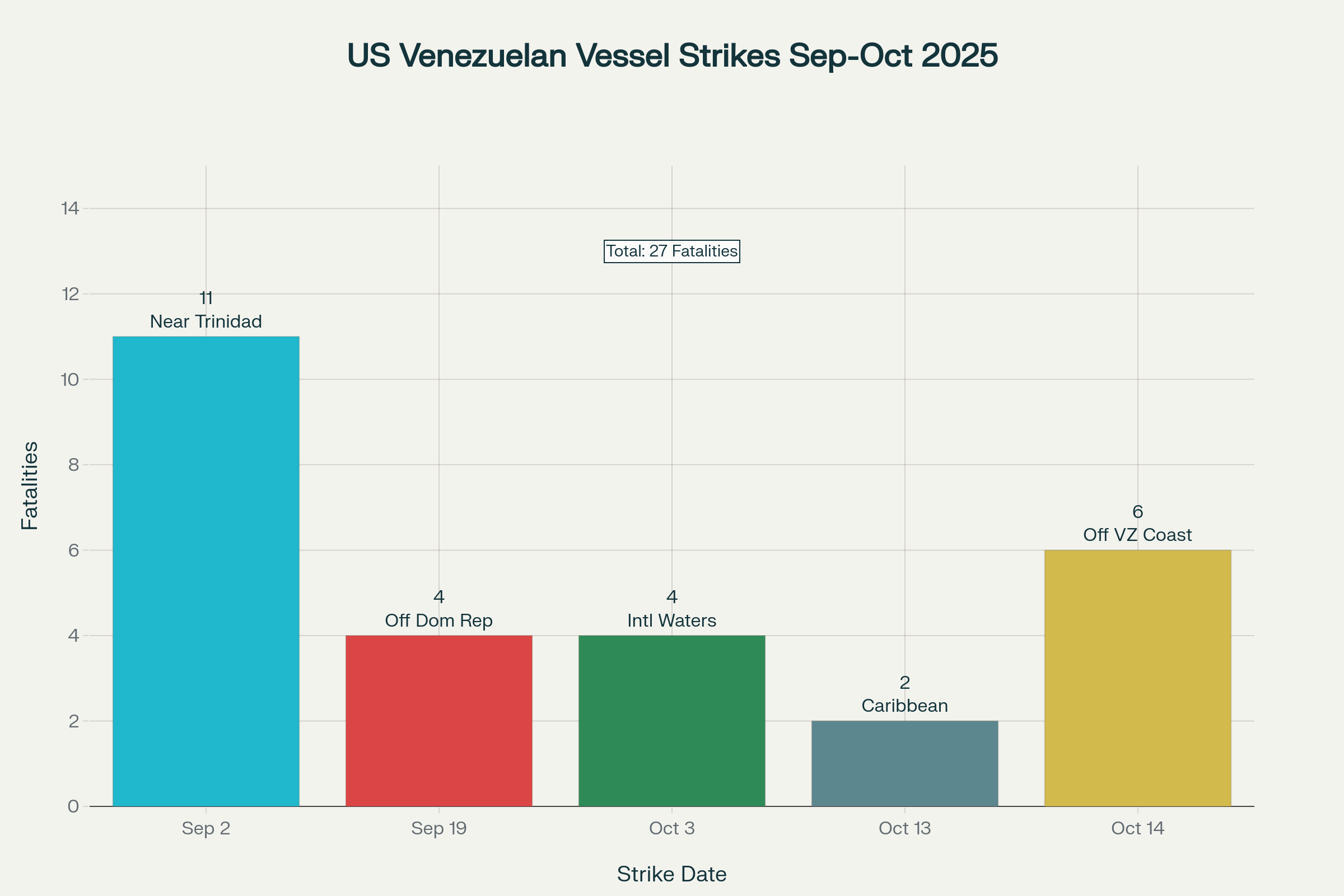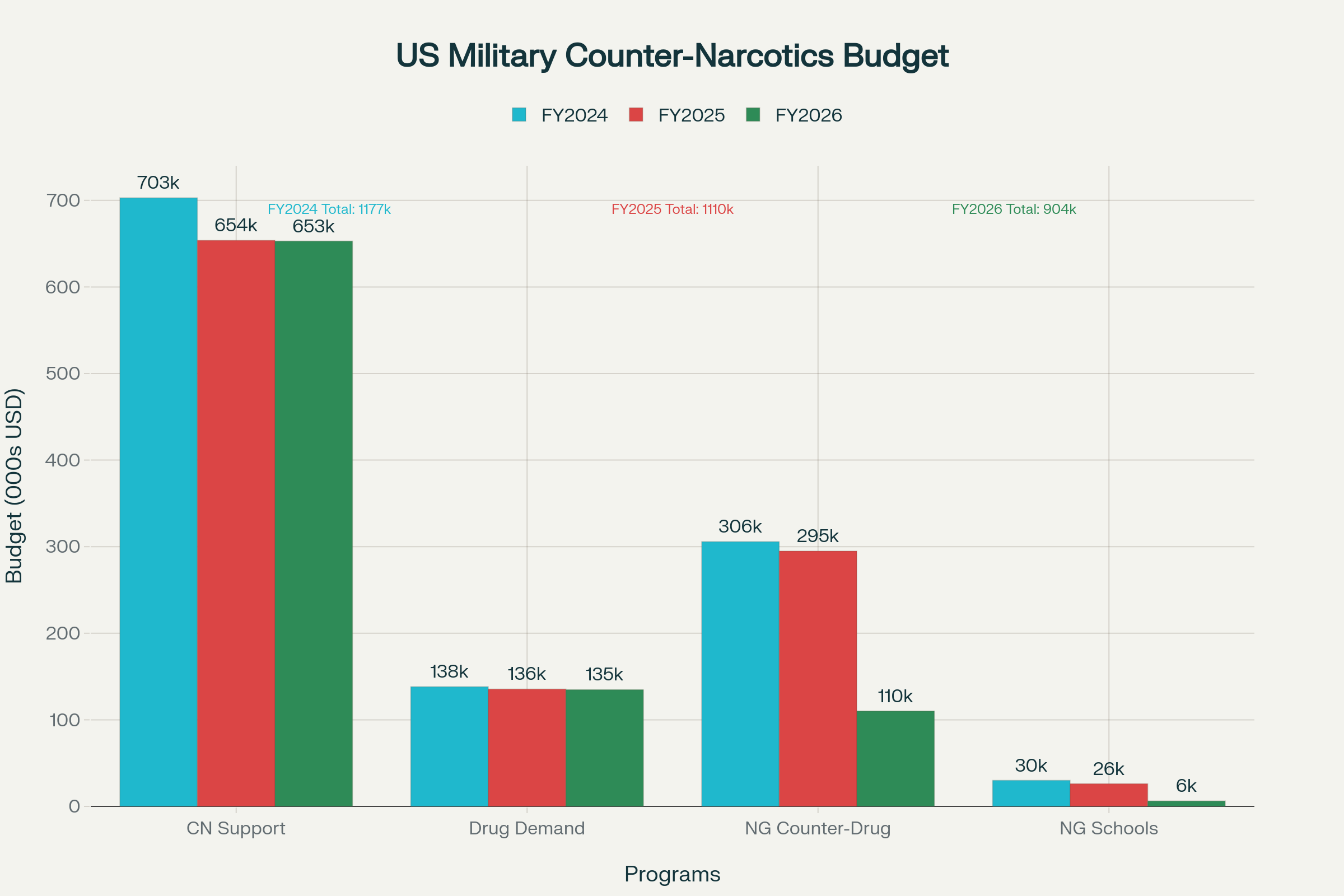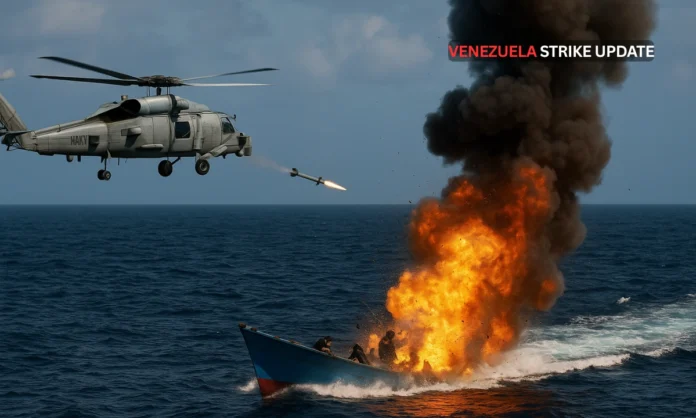Key Highlights:
- Latest US strikes Venezuelan vessel operation kills six suspected narcoterrorists in international waters off Venezuela coast
- Total fatalities reach 27 across five military operations since September 2025 under expanded Caribbean counter-narcotics campaign
- Pentagon deploys $904.3 million in counter-drug funding while designating cartels as terrorist organizations requiring military response
Trump Administration’s Military Approach to Caribbean Drug Interdiction
The United States military conducted another lethal US strikes Venezuelan vessel operation on October 14, 2025, killing six individuals described by President Donald Trump as “male narcoterrorists” aboard a suspected drug trafficking boat. Trump announced via Truth Social that intelligence confirmed the targeted vessel was “trafficking narcotics” and “associated with illicit narcoterrorist networks” while transiting along a known smuggling route in international waters.
This latest US strikes Venezuelan vessel incident represents the fifth such military operation since the Trump administration launched its aggressive Caribbean counter-narcotics campaign in early September 2025. The President shared aerial surveillance footage showing the strike, depicting a small boat being hit by a missile and subsequently exploding, while emphasizing that no US military personnel were injured during the operation.
Defense Secretary Pete Hegseth authorized the strike as part of what administration officials characterize as a “non-international armed conflict” with designated drug cartels, treating suspected traffickers as “unlawful combatants” subject to military action rather than traditional law enforcement approaches. The Pentagon recently informed Congress of this legal framework, providing justification for continued US strikes Venezuelan vessel operations against boats suspected of narcotics transportation.
The administration’s approach marks a dramatic departure from conventional counter-narcotics efforts, which historically involved seizure and arrest rather than lethal military strikes against suspected criminals at sea. Legal experts continue to question whether this US strikes Venezuelan vessel strategy complies with international law governing armed conflict and maritime interdiction.
Military Deployment and Operational Scale in Caribbean Waters
- Over 4,500 military personnel deployed to Caribbean region as part of largest naval buildup in three decades
- Multiple destroyers, guided-missile cruisers, nuclear submarines, and surveillance aircraft positioned near Venezuelan waters
- Coast Guard seizures in Caribbean reach 64 tons of cocaine in fiscal year 2025, representing one-third of total 193-ton global haul
The current US strikes Venezuelan vessel campaign operates within the context of an unprecedented military deployment to Caribbean waters, surpassing what experts consider necessary for traditional drug interdiction operations alone. Since late August 2025, the United States has positioned more than 4,500 Marines and sailors throughout the region, supported by advanced naval assets including nuclear-powered attack submarines, P-8 Poseidon surveillance aircraft, and Aegis-equipped guided-missile cruisers.
The Iwo Jima Amphibious Ready Group and 22nd Marine Expeditionary Unit lead the deployment, accompanied by specialized vessels like USS Fort Lauderdale, USS San Antonio, and the converted special operations platform Ocean Trader. Recent satellite imagery captured these military assets operating within 126 kilometers of Venezuelan territorial waters, indicating sustained operational windows for intelligence gathering and potential US strikes Venezuelan vessel operations.
Coast Guard data reveals unprecedented cocaine seizure levels, with 175,000 kilograms (193 tons) confiscated in international waters during fiscal year 2025, more than double the previous year’s total. Approximately 64 tons of this cocaine originated from Caribbean operations, highlighting the region’s continued significance as a drug trafficking corridor despite increased US strikes Venezuelan vessel activities.
The Dominican Republic has recovered over 19,000 kilograms of narcotics since January 2025, including 1,000 kilograms of cocaine from a destroyed vessel following a US military airstrike that killed three individuals. These operations have led to observable changes in trafficking patterns, with Dominican officials reporting significantly decreased drug boat sightings while Jamaican authorities note traffickers are transporting smaller quantities to minimize potential losses from US strikes Venezuelan vessel operations.

Comprehensive timeline of US strikes Venezuelan vessel operations showing escalating military action against suspected drug trafficking boats in Caribbean waters
Budget Allocation and Resource Investment for Counter-Narcotics Operations
The Trump administration’s US strikes Venezuelan vessel campaign is supported by substantial financial investment in Caribbean counter-narcotics activities, with the Department of Defense allocating $904.3 million for drug interdiction and counter-drug activities in fiscal year 2026. This represents a decrease from the $1.11 billion allocated in fiscal year 2025, primarily due to reductions in National Guard Counter-Drug Programs while maintaining core counter-narcotics support funding at $652.9 million.
Pentagon officials estimate that deploying destroyers, submarines, and Marines to Venezuelan waters costs millions in operational expenses, though exact figures for the current US strikes Venezuelan vessel operations remain classified. The Defense Department‘s operation and maintenance budget exceeds $250 billion annually, providing significant flexibility for shifting funding to support expanded Caribbean deployments without requiring additional congressional authorization.
The administration’s designation of the Sinaloa Cartel and Jalisco New Generation Cartel as Foreign Terrorist Organizations provides legal justification for military action and access to counter-terrorism funding streams. These cartels are identified as the primary producers of fentanyl, heroin, and amphetamine-type stimulants entering the United States, contributing to over 70,000 annual overdose deaths.
State Department counter-narcotics strategy documents indicate that US strikes Venezuelan vessel operations target trafficking networks responsible for transporting massive quantities of cocaine toward both US and European markets, where demand and prices continue escalating. The administration argues that military intervention represents necessary self-defense against narcoterrorist threats to American national security, though critics contend the majority of US overdose deaths result from fentanyl trafficking through Mexico rather than Caribbean cocaine routes.

US Department of Defense counter-narcotics budget allocation showing significant reduction in National Guard programs while maintaining core interdiction operations funding
International Legal Challenges and Regional Diplomatic Consequences
The escalating US strikes Venezuelan vessel operations face mounting criticism from legal experts, congressional members, and international partners who question the administration’s authority to conduct military strikes against suspected drug traffickers. Bipartisan congressional concern has emerged, with Republicans demanding additional information about legal justifications while Democrats argue the operations violate both US and international law.
Venezuelan President Nicolás Maduro has characterized the US military buildup as “an extravagant, immoral, and bloody threat,” mobilizing troops and militia members in response to potential US strikes Venezuelan vessel activities near Venezuelan territorial waters. Colombian and other regional governments have condemned the strikes, raising concerns about Caribbean stability as military tensions escalate.
The United Nations Security Council has received formal complaints from Venezuela describing the maritime attacks as “extrajudicial killings,” challenging US characterizations of the operations as legitimate counter-terrorism activities. International law experts argue that suspected drug traffickers do not meet legal criteria for armed combatants under established laws of war, making US strikes Venezuelan vessel operations potentially illegal under international maritime law.press.
The administration’s $50 million bounty on Venezuelan President Nicolás Maduro for drug trafficking charges adds diplomatic complexity to the US strikes Venezuelan vessel campaign, with intelligence sources suggesting the operations serve dual purposes of disrupting trafficking networks while applying military pressure to destabilize the Maduro government. Venezuelan officials deny American accusations of government involvement in drug trafficking while questioning the authenticity of surveillance footage released by Trump.
Legal analysts note that framing the conflict as an active armed engagement allows the Trump administration to justify expanded wartime powers, including killing suspected “enemy fighters” who have not posed violent threats and detaining individuals indefinitely without trial. This interpretation of US strikes Venezuelan vessel authority represents a significant expansion of presidential war powers beyond traditional counter-narcotics operations.
Strategic Impact on Regional Drug Trafficking Networks
The sustained US strikes Venezuelan vessel operations have produced measurable changes in Caribbean drug trafficking patterns, with smugglers adapting to increased military pressure through modified operational methods. Intelligence reports indicate traffickers are employing more discreet techniques, including concealing narcotics within legitimate food shipments and using smaller vessels to minimize potential losses from military strikes.
Recent weeks have seen cocaine bales washing ashore in Trinidad and other Caribbean islands, packaged with ropes and hooks indicating they were intended for water retrieval, suggesting US strikes Venezuelan vessel activities are disrupting established trafficking networks. Several significant cocaine bundles discovered throughout the Lesser Antilles bear markings indicating Colombian origin, demonstrating continued South American cartel involvement despite military pressure.
Jamaica’s Narcotics Division reports seizing over 2,508 kilograms of cocaine in 2024, with officials observing tactical shifts in response to US strikes Venezuelan vessel operations. Patrae Rowe, head of the Firearms and Narcotics Investigation Division, noted that traffickers are “using more discrete methods to move drugs” as military surveillance intensifies throughout the region.
The Trump administration maintains that US strikes Venezuelan vessel operations target vessels associated with designated terrorist organizations, though officials have not provided evidence supporting specific organizational affiliations of targeted boats. Administration sources suggest the military campaign aims to pressure both drug trafficking networks and the Venezuelan government simultaneously, representing broader strategic objectives beyond simple narcotics interdiction.
Intelligence assessments indicate that while US strikes Venezuelan vessel operations have disrupted some trafficking routes, global cocaine supply remains at unprecedented levels, with European markets offering higher prices than traditional US destinations. This economic incentive continues driving trafficking organizations to seek alternative transportation methods despite increased military risks in Caribbean waters.
Closing Assessment
The October 14 US strikes Venezuelan vessel operation bringing total fatalities to 27 across five separate incidents demonstrates the Trump administration’s commitment to militarized counter-narcotics enforcement in Caribbean waters. The unprecedented $904.3 million counter-drug budget allocation and deployment of over 4,500 military personnel signal sustained investment in this approach despite mounting legal challenges and international criticism.
The administration’s designation of drug traffickers as “unlawful combatants” within a “non-international armed conflict” framework provides justification for continued US strikes Venezuelan vessel operations while expanding presidential war powers beyond traditional law enforcement boundaries. As trafficking organizations adapt their methods and regional governments mobilize defensive responses, the long-term effectiveness of military strikes against suspected drug vessels remains uncertain.
Congressional oversight, international diplomatic pressure, and legal challenges will likely influence the scope and duration of future US strikes Venezuelan vessel operations as the administration balances counter-narcotics objectives with broader strategic goals in Latin America. The campaign’s impact on both drug trafficking networks and US-Venezuela relations continues evolving as military operations expand throughout the Caribbean region.


